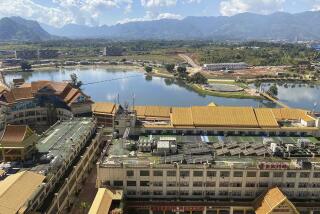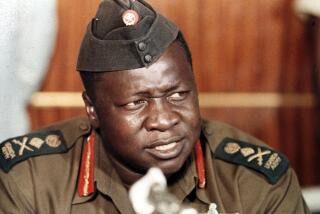Congo M23 rebels withdraw from strategic city of Goma
GOMA, Congo — The rebels’ truck rounded the corner at breakneck speed and skidded onto the wrong side of a pitted bush road, with several dozen fighters swaying on the back. Two weeks after seizing the eastern Congolese city of Goma, the M23 rebels were withdrawing Saturday, leaving behind an uneasy city.
They snaked along the road north, riding in looted government cars, trucks piled high with mattresses and a minibus stolen from the state television and radio agency. One M23 spokesman stood by his fancy SUV, which had broken down in the road, trying to make a call. Others trudged on foot, carrying boxes of ammunition and bundles of food and clothing on their heads.
M23 fighters, backed by neighboring Rwanda, caused a geopolitical crisis with their surprise capture of Goma nearly two weeks ago. They embarrassed Congolese President Joseph Kabila, whose troops gave up the city without a fight. They exposed Rwandan President Paul Kagame, whose persistent military interference in one of the world’s most troubled regions was widely condemned. And they triggered criticism of the U.N.’s peacekeeping mission, with Congolese complaining that the world body’s troops should have repelled the rebels, even as government forces retreated.
M23, accused of myriad human rights abuses, is the latest in a string of militias in the Democratic Republic of Congo’s troubled east with strong ethnic and military links to the Kagame government, always denied by Rwandan authorities. A recent United Nations report on the conflict offered strong evidence of Rwanda’s military support for the rebels.
Congo’s east has seen years of conflict, much of it linked to internecine struggles to control minerals and other wealth, with regional and ethnic tension complicating the picture.
The rebels withdrew after intense regional and international pressure on M23 leaders, which culminated in a deal last weekend reached in Kampala, the capital of neighboring Uganda. Rwanda, accused of fueling conflict in the volatile and resource-rich area, appeared eager to demonstrate that it could get the rebels to pull out of Goma. In recent days, however, M23 leaders repeatedly contradicted one another on whether they would leave.
Despite the withdrawal to a town north of Goma, one M23 commander told The Times that the rebels could retake the city at any time if Kabila’s government failed to meet their demands, which include influential positions, improved infrastructure and moves to reduce corruption.
“Leaving Goma is not a problem. We will be just 20 kilometers away, so taking over Goma again is not a problem for us,” said Seraphin Mirindi Murhula, the commander.
About 40 miles to the north of Goma in Rutshuru, the main rebel base, a senior M23 leader echoed that view. “We are pulling out but we can come back anytime. We have thousands of tons of ammunition,” said Benjamin Mbonimpa, the regional administrator of Rutshuru.
After rebels left, the mood in Goma was relief and trepidation. A group of boys piled onto the back of a truck, staging an impromptu celebration parade around the city, and some cars tooted horns in celebration.
Many in Goma were hostile to the M23 rebels, perceived by some as a “foreign” force.
“We are so happy to see them go because we feel more comfortable now,” said Patrick Kanamule, 30, who was selling cellphones by the roadside. “But I saw there are some [rebels] who took off their military uniforms and they’re still here. We’re afraid about that because these are not good people.”
“At least we can breathe,” said John Banzi, 30, a butcher in a small market, “because when they’re in town, they’re not for our interests, they’re for foreign interests: Kagame’s interests. They took all the wealth of this country.
“But [M23] spies are still around in some areas. That’s their way of behaving.”
There was also uncertainty in the city about who was in administrative control after the M23 withdrawal.
“I have no idea who’s in charge,” said an official in customs, one of the key revenue-raising departments in Goma, which until Saturday was controlled by rebels.
More to Read
Start your day right
Sign up for Essential California for news, features and recommendations from the L.A. Times and beyond in your inbox six days a week.
You may occasionally receive promotional content from the Los Angeles Times.






